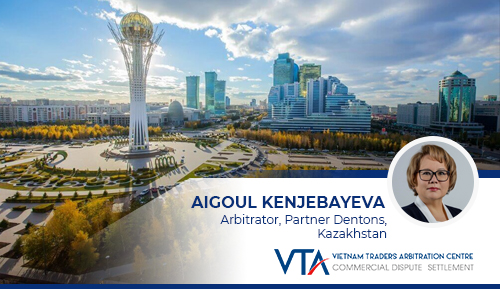The Role of Women in Arbitration: A Case for Gender Equality in Kazakhstan
The differences between men and women have been acknowledged as a fundamental aspect of human existence, with various implications across different fields. While certain sectors, such as sports or physical labor, may highlight these differences more prominently, other domains, particularly those involving professional dispute resolution, should prioritize equality over gender-based distinctions.

Even in industries such as energy and construction—often regarded as technical and male-oriented—the success of professionals hinges on their skills, experience, and personal qualities rather than their gender. Therefore, it is imperative to foster an environment where all lawyers, regardless of gender, have equal opportunities to thrive and develop the necessary competencies for success.
Successful dispute resolution requires a diverse set of skills, including legal expertise, negotiation capabilities, and analytical reasoning. These competencies are not inherently linked to gender, reinforcing the necessity of dismantling stereotypes that suggest otherwise. Promoting gender equality in legal professions, particularly in arbitration, is essential not only for fairness but also for enhancing the effectiveness and richness of dispute resolution processes. A diverse panel of arbitrators can offer varied perspectives that contribute to more comprehensive and nuanced decisions.
In the context of Kazakhstan, the issue of gender diversity in the legal sector appears to be less pronounced than in many other countries. Historically, Kazakhstan's legal landscape has been shaped by its unique socio-cultural evolution. Prior to gaining independence, Kazakhstan operated under a Soviet planned economy, which limited the demand for commercial lawyers. As a result, the legal profession was characterized by a predominance of men in criminal law, while women gravitated toward civil law. However, as the need for commercial lawyers grew in the post-Soviet era, women emerged as key players in this domain. My experience in establishing the Almaty office of Salans in 1994 illustrates this shift; during our recruitment process, my partner and I found that the majority of qualified candidates were women. Currently there are 46,01% women in Kazakhstan Bar Association which consists of commercial lawyers, and 38% women in the Republican Collegium of Advocates which consists of lawyers authorized to handle criminal cases.
The historical context of women's roles in Kazakh society contributes to a more balanced professional environment. Unlike in many cultures where women faced significant oppression, Kazakh women traditionally enjoyed greater freedoms. They participated equally in nomadic life, were valued as crucial contributors to their families and communities, and even took on roles as warriors defending their tribes. Additionally, the Soviet Union's ideology emphasized gender equality, further embedding this principle into the fabric of society.
That said, it would be naive to assert that gender-related issues have been entirely resolved, particularly concerning domestic violence and discrimination that still permeate many aspects of life in Kazakhstan. However, when we examine the legal profession, we find a contrasting landscape. The increasing presence of women in arbitration signifies progress towards gender balance, underscoring the necessity for continued education and the cultivation of conditions that empower women to achieve professional independence. While the issue of gender equality, especially in arbitration, seems to raise fewer concerns these days, we must remain vigilant and maintain awareness of this critical issue. Discussions surrounding gender equality are always needed; we stand on the shoulders of thousands of brave women who fought for equality, and we must not lose sight of their achievements.
In my experience as an arbitrator during the last 2 years, I was involved as an arbitrator in seven cases, with one still ongoing. These cases were managed by a mix of local and international arbitration institutions, including the Stockholm Arbitration Institute, the International Arbitration Center of AIFC, Russian Arbitration Center, Tashkent Arbitration Center and Atameken Arbitration Center. Notably, I served as the sole arbitrator in four instances and was part of panels that included two women in two cases and three women in one case. Out of the total 13 arbitrators involved, 11 were women, demonstrating a remarkable representation in a field often perceived as male-dominated. The complexity of these cases—ranging from heavy industry disputes to M&A transactions—further illustrates that women are not appointed merely because the cases are less demanding. Instead, this trend reflects a growing recognition of women's capabilities and contributions in arbitration.
In conclusion, the future of international arbitration should prioritize gender equality and the dismantling of outdated stereotypes. By ensuring that all professionals, regardless of gender, have the opportunity to develop their skills and participate fully in the legal arena, we can foster an environment that enriches the quality of dispute resolution. As we continue to embrace diversity, we not only uphold the principles of fairness and justice but also enhance the effectiveness of our legal systems for the benefit of all.
____
Aigoul Kenjebayeva
Arbitrator, Partner Dentons, Kazakhstan

VTA’s Model Arbitration Clause: “Mọi tranh chấp phát sinh từ hoặc liên quan đến hợp đồng này sẽ được giải quyết bằng trọng tài tại Trung tâm Trọng tài Thương nhân Việt Nam (VTA) theo Quy tắc tố tụng trọng tài của Trung tâm này”. “Any dispute arising out of or in relation with this contract shall be resolved by arbitration at the Vietnam Traders Arbitration Centre (VTA) in accordance with its Rules of Arbitration”.
The Vietnam Trade Arbitration Center (VTA) is responsible for organizing and coordinating the resolution of business disputes through institutional arbitration, with jurisdiction over disputes including: (i) disputes arising from commercial activities between parties; (ii) disputes involving at least one party engaged in commercial activities; and (iii) disputes as prescribed by law to be resolved by arbitration.





